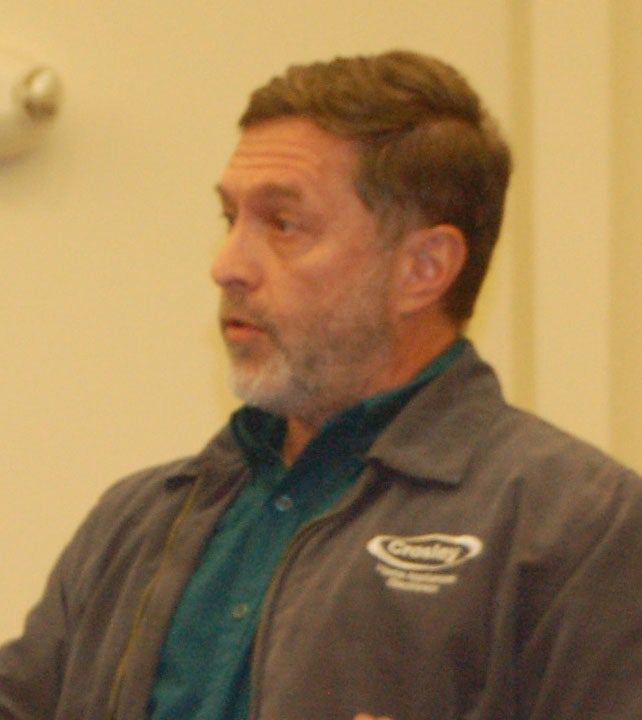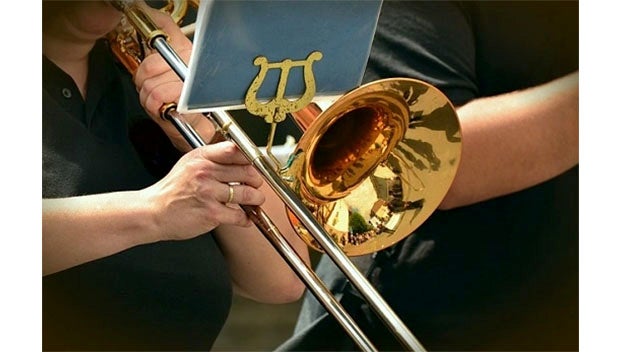Supervisors pass event permit
Published 12:35 pm Wednesday, November 16, 2016

- Photo by Martin L. Cahn Anthony Eamon makes a point while speaking during a public hearing on an event permit ordinance at the Lunenburg County Board of Supervisors meeting Thursday night.
People in Lunenburg County who want to hold events they believe will attract 100 or more people will have to start submitting event permit applications to the county before being allowed to hold the events.
The Lunenburg County Board of Supervisors unanimously passed an ordinance creating the event permit during its meeting Thursday. The board did so after holding a public hearing during which Community Development Director Beverly Hawthorne explained the permit and two county residents spoke.
Hawthorne said “more and more people” are trying to do things on their property, turning them into event venues. She said the permit isn’t so much about telling people what to do as much as making things safe for everyone.
“It’s in between having nothing on the books to something” more substantial, she said.
County resident Patricia Harper-Tunley asked whether or not the permit would be required for marches and walks. Hawthorne said it would not, as those take place in Virginia Department of Transportation rights-of-way.
The ordinance is required of events expecting 100 or more attendees, and those expecting 500 or more. In both cases, the event’s boundaries must be no closer to neighboring properties by 500 feet — an increase from an originally proposed 300-foot distance boundary. Events cannot take place between 1-7 a.m.
Exempt special events include those at private residences where the host or manager is not compensated for the event and guests are not charged admissions, such as a wedding or family reunion. Events sponsored by the county or one of its towns are exempt, as are events at sites meant to host such events, such as sports stadiums. Non-profit church events on church-owned properties are also exempt.
Regardless, all events must still abide by other county ordinances, such as Lunenburg’s relatively new noise ordinance. Hawthorne said there is also a $100 permit fee.
County resident Anthony Ehman brought up the question of whether 300 feet was still too close, leading to the board’s decision to expand it to 500 feet. Ehman said he was also concerned some buildings in his neighborhood built for one purpose are being used as venues.
“This was supposedly constructed as a barn,” Ehman said of one location, “but this barn is being used for weddings, reunions — family … high school … college — and are being compensated for it.”
He claimed some of these venues’ preferred vendors are receiving additional trade benefits they are allowed to use the venue in exchange for other services later on.
The board officially took up consideration of the event permit ordinance a short time later. Officials indicated the barn Ehman mentioned would be “grandfathered” into the ordinance, meaning it would not be subject to its rules.
Ehman, however, claimed it is one of two buildings on the particular property and that one could be grandfathered, but the other should not.
“It was put up differently. The way that I understand of how things were passed last year, there should have been a public hearing for that building (they) put up. There wasn’t, because they misrepresented themselves in their original building permit to put (it) up as a barn and then after … they go back and say, now, ‘We’re going to do this,’ and the building inspector goes back and says they have to make these small changes so the barn can now be called a commercial building.”
He said the “barn” was only put up in the last 18 months whereas the other building, dates back to 1916.
County Attorney Frank F. Rennie IV said even if a venue received a permit, it would still have to abide by the county’s noise ordinance. Ehman, however, said the problem is more than just noise, but the “total aspect” of having people turn around in his yard, finger pointing, cussing and causing other problems.
Rennie pointed out the permit application includes verbiage addressing items such as traffic control, reasonable lighting and music not playing in violation of the noise ordinance. It also includes, he said, a statement to be signed by all adjoining neighbors agreeing to the event being hosted on the property.


